WordPress Plugins For Managing WordPress Post Revisions
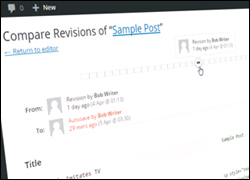
In a separate tutorial, we looked at the WordPress Post Revisions feature, where WordPress saves all your post revisions, so you can always go back to an earlier version of what you have written and restore it.
In this tutorial, we look at a number of WordPress plugins that will help you manage your post revisions.
Content Revision Management Using Plugins
As soon as you update a page/post, WordPress begins to store new post revisions in its database. You can see these displayed in a Revisions section below the page editor …
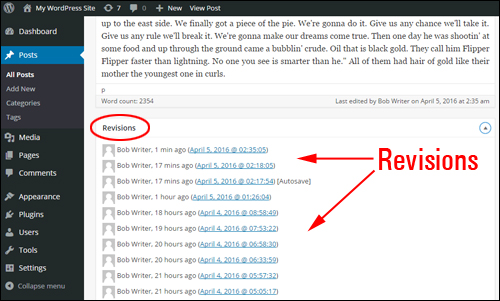
(Post Editor screen – The post revisions list)
For most users, having autosave and revisions is a good thing. If you write often, however, the number of revisions can start building up. This can significantly bloat the size of your WordPress database, so it’s important to manage your revisions.
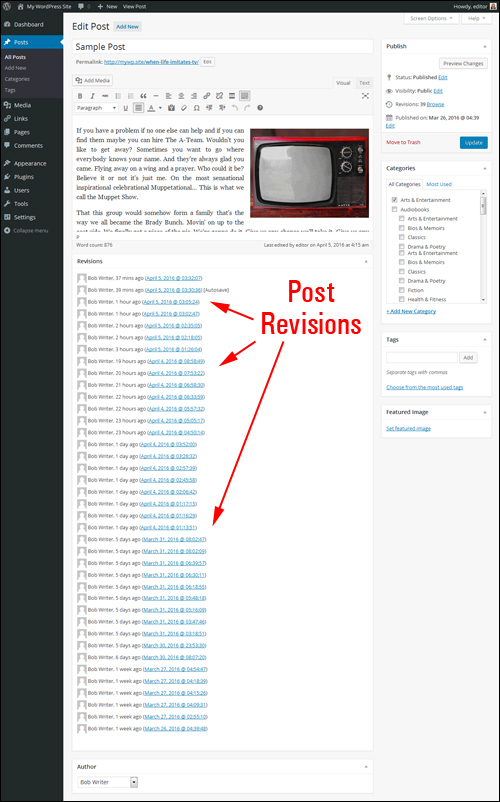
(Post revisions can really add up after a while)
For example, if you have 10 posts published on your site with an average of 5 revisions each your WordPress database could be storing an extra 500 copies of unnecessary data. If your post averages 100KB data, then with 500 revisions, the total database space wasted is about 50MB.
The good news is that there are a few great plugins for WordPress to help you manage your revisions and reduce the size of your database. Here are a few:
Better Delete Revision
(Better Delete Revision)
Better Delete Revision deletes redundant post revisions from your WordPress database and other revision-related content like meta data, tags, relationships, and more.
After the plugin has been installed and activated, you can optimize your WP database.
Log into the WordPress Dashboard and choose Settings > Better Delete Revision …
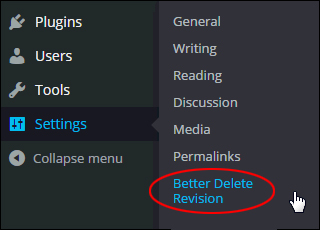
(Better Delete Revision – WordPress Settings Menu)
This brings you to the Better Delete Revision Manager area. Click ’Check Revision Posts’ to calculate how many redundant post revisions can be safely deleted from the database …

(Check Revision Posts – Better Delete Revision Manager)
Depending on the number of posts and revisions related to each post entry, the plugin calculates and returns a table of post revisions stored in the WP database …
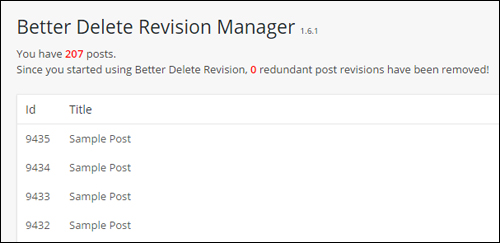
(Posts revisions)
Click on the button below the list to delete the items from the WordPress database, or cancel the task and exit the plugin settings screen …
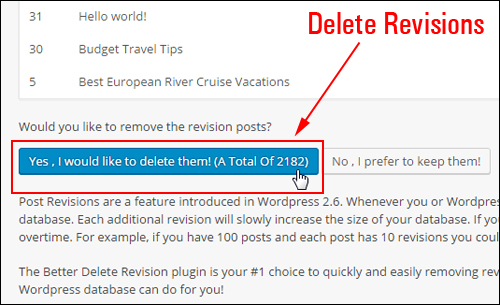
(Clear posts revisions)
The unnecessary post information will be cleared from your database …
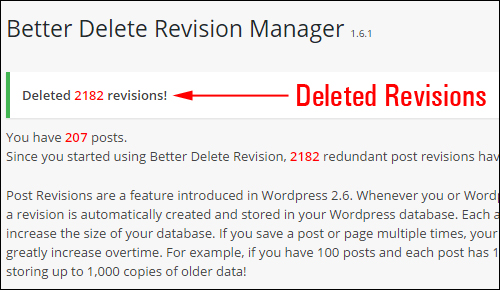
(Better Delete Revision – Revisions cleared)
![]()
As WordPress automatically stores all new post revisions, the process will automatically start again. After some time has passed, therefore, we recommend repeating this process to keep your WP database as light as possible …
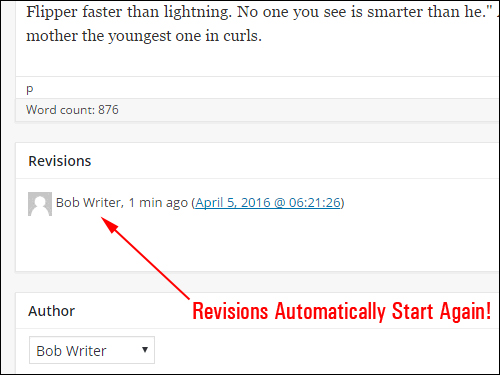
(WordPress will automatically begin saving your post revisions again!)
You can also use this plugin to optimize the database …

(Optimize the site’s database)
The plugin checks to see if the database needs optimization and lets you run an easy one-click optimization maintenance routine without requiring you to log into your server control panel …
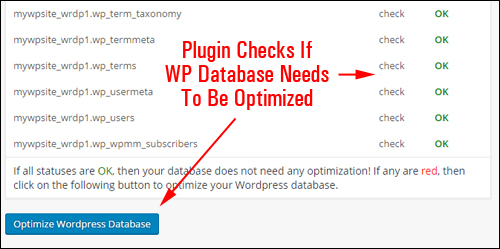
(Better Delete Revision checks if the database tables need optimization)
For more details, go here: Better Delete Revision Plugin For WordPress
Optimize Database after Deleting Revisions
(Optimize Database after Deleting Revisions WordPress Plugin)
This plugin is similar to the one described above. It not only lets you delete redundant revisions of pages and posts (with the option of keeping an ’x’ amount of your most recent revisions) and checks if the WordPress database needs optimization, it also lets you do maintenance tasks like:
- Delete trashed comments, posts, and pages
- Delete spammed comments
- Delete ‘expired transients’
- Exclude selected tables and/or specific posts/pages from cleaning and optimization
- Automatically schedule optimizations
- And more!
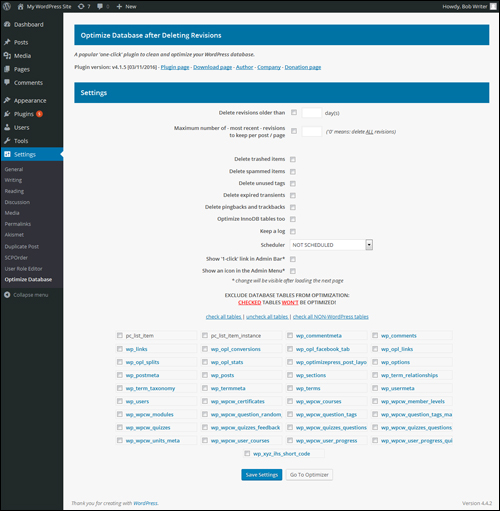
(Optimize Database after Deleting Revisions Plugin – Settings)
For more details, go here: Optimize Database after Deleting Revisions WordPress Plugin
WP Optimize
(WP-Optimize Plugin For WordPress)
In addition to performing tasks such as cleaning unnecessary page and post revisions and checking if the WordPress database tables need cleaning and optimization, WP Optimize also lets you do the following maintenance tasks:
- Enable/Disable comments for all published posts
- Remove trashed comments
- Mobile device friendly (optimize your site from anywhere)
- Removal of all transient options
- Clean up auto draft posts
- Ability to keep data from selected number of weeks when cleaning up
- Option to add or remove link on WP admin bar
- Enable/Disable weekly schedules of optimization
- View database table statistics
- Receive email notifications after automatic database cleanup
- Highlights dangerous cleanup items in red
- And more!
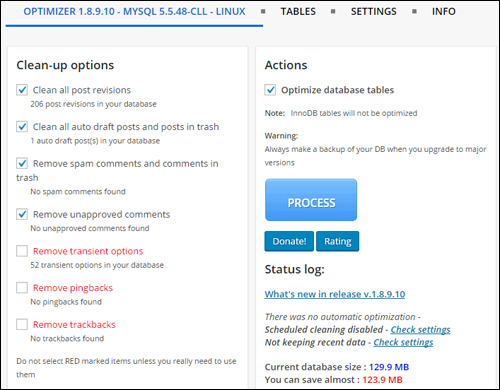
(WP Optimize – Settings)
For more details, go here: WP-Optimize WordPress Plugin
WP-Sweep
(WP-Sweep Plugin)
In addition to optimizing your database tables and deleting unnecessary post revisions, WP Sweep also cleans up:
- Auto drafts
- Deleted comments
- Orphaned user meta
- Duplicated comment meta
- Unused terms
- And more!
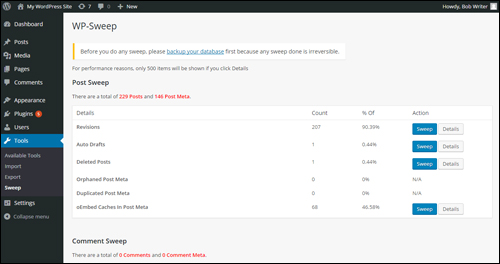
(WP-Sweep – Settings Screen)
For more details, go here: WP-Sweep Plugin For WordPress
Simple Revisions Delete

This lightweight and simple-to-use plugin lets you purge (delete) your posts revisions either individually or all at once.
Once the plugin has been installed and activated, for example, a ‘Purge’ link appears next to the Revisions section in your Publish box (and in other sections of your admin area) allowing you to safely delete revisions.

For more details, go here: Simple Revisions Delete
WP REVISIONS CONTROL

This plugin lets you specify the number of revisions retained for each post type in the Settings > Writing screen.

For more details, go here: WP Revisions Control
For more plugins that can help you manage post revisions and optimize your database, go to Plugins > Add New and type in keywords like “Manage Post Revisions“, “Optimize Database“, etc …
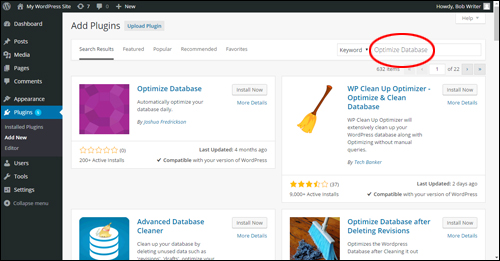
(Add Plugins – WordPress Plugins Menu)
We hope that you have found the above information on plugins that will help you manage your WordPress post revisions useful.
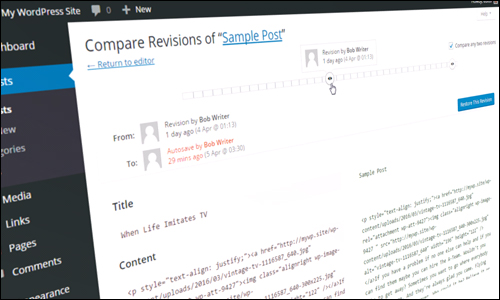
***
"These tutorials have so much information and are easy to understand. If you use WordPress or plan to in the future these will help you with everything you need to know." - Valisa (Mesa, Arizona)
***



